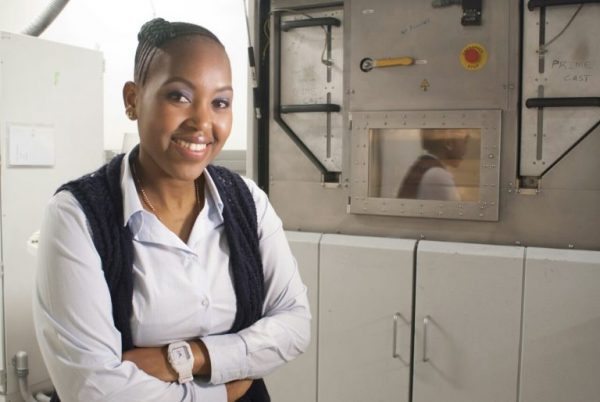Meet the Tony Elumelu Entrepreneurs Selected for 2018 Forbes Africa Under 30
The 2018 Forbes Africa Under 30 is a list of Africa’s most promising young change-makers. This fourth edition features 6 Tony Elumelu Entrepreneurs from varying sectors making impact and giving a bright hope for the future of Africa.
Meet the selected Tony Elumelu Entrepreneurs:

Founders: Slatecube
Slatecube helps job seekers develop job-relevant skills, gain work experience, and land well-paying jobs through up-skilling courses and virtual internships.
“We aim to bridge the gap between qualification and employment which has, for so long, been a leading factor in the high unemployment rate of youth all over sub-Saharan Africa,” says Chris.
Since launching in 2014, the company has helped hundreds of graduates get into full-time employment, trained over 13,000 graduates in full-stack web development, design (graphics design and animations), and digital marketing across Nigeria and Ghana and have 7,000 active users taking online programs.
“Ten percent of our beta testers have gone on to start their own businesses and also got access to funding ranging from $5,000 to $25,000.”
In 2015, Chris was selected out of 20,000 applications for the Tony Elumelu Entrepreneurship Programme, this meant he got his first funding and seed capital which he says has paved the way for several more funding including studying on Global Entrepreneurship at the MIT. With the network and the business idea validation that came with his selection on the TEF programme as his biggest take away, Chris is set to tap more by providing technical expertise to Tony Elumelu Entrepreneurs in need of skills in Technology, Design and Marketing.
Slatecube also won the Anzisha Prize in 2015, presented at the African Union during the e-Learning Africa Conference in 2016 and was invited by former US President Barack Obama to attend the Global Entrepreneurship Summit in San Francisco.

Nneile Nkholise, 29, South Africa
Founder: iMed Tech
Nkholise was an entrepreneur since primary school. She first sold a pig to make money for her school fees and made more money either selling goods or doing hair.
“I still remember when I was around eight, some lady who owned a tuck-shop in our street asked us [kids from the street] to go and sell bananas for her because she had bought a lot and no one was buying them and so they were about to go off. I took more than anyone in our group and somehow all the other kids didn’t know how or where to sell. I just went street to street, knocked on every door selling,” she says.
In 2015, she had a dream to start a medical design, engineering and technology company. She entered and won the SAB Foundation Social Innovation Award. At the time, she had nothing but a big dream and designs on paper.
“To have people believe in us at that moment is the greatest achievement because we had so many writings on the wall telling us we cannot make it and that we were creating products that can never fit into the South African market.”
She gambled her pension fund money from her previous job and added to the SAB prize money to start iMed Tech.
“Self-doubt is the greatest hardship I faced in my business. Self-doubt is the reason why in 2016 my business was close to failure, because the disease of self-doubt created symptoms of bankruptcy, poor business management, poor strategy development and execution.” But this changed for her in 2016 when she was selected on the TEF programme. “TEF offered me a wealth of knowledge that one could not have easily gotten anywhere else. The foundation also gave me lots of exposure in Africa because it is an honour being associated with Tony Elumelu’s brand,” she says.
Nkholise stood strong and today, iMed Tech employs five people and primarily focuses on medical prosthetic and bio-implant design and manufacturing.

Bamai Namata, 26, Cameroon
Founder: Maibeta
Namata grew up in the small town of Mundemba on the Cameroon-Nigeria border. Here, he learned how to sell products and build a client base from his mother, a petty trader.
“I have always been fascinated by computers and electronics. Everyone else in my surroundings was encouraged to become either a teacher or join the armed forces but I always had a bigger vision and knew long-term thinking was the way to go,” he says.
After completing a degree in mass communication, he tried and failed to secure a loan from family and friends to start a business. The only other option was to work and save money. First, he worked as a plantation laborer for $28 dollars a month. He swapped this job with another at a local NGO, where he worked for three years and saved up enough money for his startup.
In 2015, he founded Maibeta.com a digital on-demand service platform connecting people to professional technicians for repairs, maintenance and construction jobs. The company makes over $150,000, employs nine people, has conducted 2,300+ transactions and impacted more than 9,000 people.
Namata also received a Tony Elumelu Foundation Entrepreneurship Programme award in 2016, Avance Media’s Cameroon’s most influential in business award in 2017 and was one of Cameroon News Agency’s entrepreneurs to watch out for list in 2017.

Abraham Omani Quaye, 28, Ghana
Founder: Farmart
After completing his undergraduate degree in agricultural sciences, he decided to go into farming. During his search for land, he came across farmers who complained about their produce going to waste because of low fresh sales.
“To avoid this, they’ll have to sell their produce off cheaply to the middlemen to avoid getting nothing out of their hard work. I also discovered in Ghana, farmers suffer over 30% post-harvest losses which is really unfortunate,” he says.
Quaye was motivated to not just be a farmer but a digital farmer and help other farmers have access to a ready market, reduce post-harvest losses and increase their return on investments. He founded Farmart, an online farmers’ market that links farmers to households and businesses. When an order is placed on their website, they source fresh produce from farmers and deliver to the client. They deliver produce and groceries in Accra, Tema and Kasoa.
“When we started the business, we didn’t have enough bikes to make deliveries which made us lose some deliveries and we quickly partnered with logistics firms who now support us when there’s a spike in orders. We also faced lots of challenges with lack of some produce and we decided to start Farmart.”
In 2017, He was selected on the TEF programme, “I was lucky (grace) to be part of 24 other Ghanaians among the 1000 African Entrepreneurs selected from 93,000 applications from 55 African Countries. My selection on the Programme gives a great pat at the back knowing that my team and I are on a great path of building a robust food system that has the capacity to end hunger and poverty.
The Tony Elumelu Entrepreneurship Programme really is the DREAM of every young ambitious African Entrepreneur to enroll in due to the enormous benefits it comes with.”
It has won recognition such as the 2017 Pitch AgriHack Africa winner by Technical Centre for Agriculture and Rural Cooperation.

Founder: Greenpact
This 20-year-old is making money from waste while solving a serious problem. He is the founder of Greenpact, a company which produces and distributes affordable and high-quality innovative biogas digester systems to get bio-gas from both agricultural and human refuse. His mission is guided by the overarching vision to become the leading provider of clean household energy solutions across East Africa. The mentoring, training and funding from TEF was a key foundational catapult in my entrepreneurial journey, not only as a an social entrepreneur but also an African leader.
In 2015, Leroy was selected on the TEF programme as one of the youngest in the cohort. The training from TEF also exposed me to the concept of Africapitalism, an important tool if at all we are to make socio-economic progress on the continent–a key concept Mr. Elumelu has always embodied.
The training has been very foundational. Being the youngest at only 18 in my cohort has really informed my journey in leading, hiring and firing with my main company Greenpact. The lessons learnt inspired me to increase my impact footprint in my community. This led to me starting CampBuni, a social enterprise that teaches high school aged children human centered design thinking and entrepreneurship. By teaching youth such important skills at such a young age, we can only anticipate for problem lovers, not people who will shy away from solving our own problems.
The funding admittedly has been a barrier breaker. Despite having raised much more from investors and grants after, TEF has a special mark as a foundational seed for Greenpact. Going through TEF has also increased my validity as an entrepreneur with a couple of engagements I have had as a social entrepreneur.”

Founder: Kene Rapu
Through her first product line, ‘Slippers by Kene’, launched in 2011, Rapu became an entreprenuer who promotes the growth of Nigerian industry by using locally-sourced materials to make slippers and sandals. She says running a business is hard work, even more so in Nigeria.
“The odds are against us, as more businesses are expected to fail than to succeed. From lack of adequate power supply, to sufficient skilled man power, to the costs and scarcity of materials, the list goes on,” she says, adding that it’s harder for women.
“I remember on my hunt for property for my factory last year, I met a gentleman who made it extremely clear he would not, under any circumstances, rent his property out to women.”
Rapu holds a law degree from the University of Bristol and a Master’s in Fashion Entrepreneurship from the London College of Fashion. In 2016, she was selected by the Tony Elumelu Foundation as one of 1,000 African entrepreneurs whose idea could change Africa, and in 2017, was listed as one of 100 Most Influential Women in Nigeria by Leading Ladies Africa.
